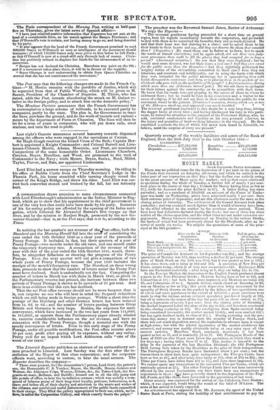In noticing the last quarter's net revenue of thejost-office, both
the Standard and the Morning Herald fall into the error of considering the year ended the 10th October 1840 as a clear year of the proceeds of Penny Postage. It included, in fact, but three quarters of a year of Penny Postage—two months under the old rates, and one month under the temporary fourpenny rate. A comparison of the revenue of this year with that of the year ended the 10th October 1841, would, there- fore, be altogether fallacious as showing the progress of the Penny Postage. Even the next quarter will not give a comparison of two whole years of Penny Postage, because the year 1840 includes the receipts of the month's fourpenny rate. The Standard, on these wrong data, proceeds to show that the number of letters under the Penny Post must have declined. Such is undoubtedly not the fact. Comparing the number of letters in March last with those in March 1840, as given in the Parliamentary returns last printed, the increase between those two periods of Penny Postage is shown to be upwards of 21 per cent. And there is no evidence that this rate has declined.
That the net Post-office revenue should not be more buoyant than It is, can surprise no one who will bear in mind the frequent reductions which are still being made in foreign postage. Within a short time the postage of the Hamburg and other German letters has been reduced from Is. 8d. to 6d. ; and the number of letters passing between Great Britain and Germany is very large. Besides, the expenses for mail- conveyance, which have increased in the two last years from 114,0001. to 181,0001., as appears from the Parliamentary paper already alluded to, exercise considerable influence on the net revenue, and have no connexion with the Penny Postage, though a material one with the speedy conveyance of letters. Even in this early stage of the Penny Postage, under all possible modifications, the Post-office returns above 30 per cent profit after paying all its expenses, without any outlay. Pretty well for an impost which Lord Ashburton calls "one of the worst of our taxes."


























 Previous page
Previous page